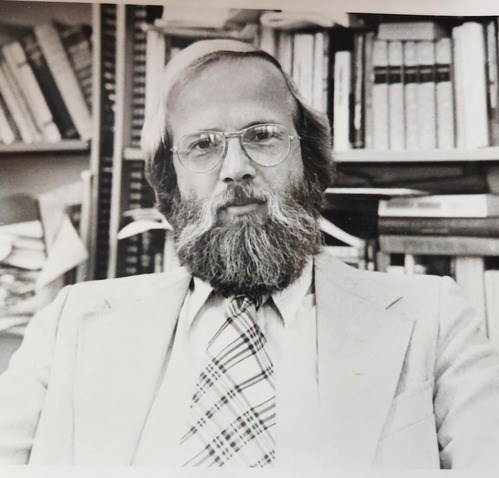 Bernard “Buck” den Ouden, a much-beloved professor emeritus of philosophy who inspired generations of UHart students, died on Nov. 15, at the Massachusetts home that he and his wife built in the 1970s.
Bernard “Buck” den Ouden, a much-beloved professor emeritus of philosophy who inspired generations of UHart students, died on Nov. 15, at the Massachusetts home that he and his wife built in the 1970s.
den Ouden arrived at UHart in 1969, and over the ensuing 45 years, his involvement on campus extended far beyond his role as professor of philosophy. He also served as chair of the philosophy department, director of the Humanities Center, faculty advisor, and course coordinator. den Ouden was the 1993 recipient of the Roy E. Larsen Award, which honors a full-time UHart professor for excellence in teaching and contributions to university life.
“Buck had a special interest in using philosophy to inspire students to think critically and to involve themselves with the greater good of humankind,” recalls President Emeritus Walter Harrison. “He went to countless athletic events and other student-centered events around campus. He was truly devoted to his students and to the life of the mind.”
One of the many students impacted by den Ouden’s mentorship was Tanika Price ’05.
“Bernard was deeply committed to the intellectual life, but he tested academia's rigid structures and lived by the belief that ‘school shouldn’t get in the way of education,’" Price recalls. “He understood that genuine learning transcends institutional boundaries and thrives in an atmosphere of warmth and trust. He supported students on a profound, holistic level. He didn’t just host office hours; he invited students intimately into his home for class (his wife, Beverly, making lunch). By moving the discussion from a lecture hall to his living room, he stripped away the formality, creating a sanctuary where philosophical inquiry became a shared, human experience. This was mentorship in its purest form—a commitment to nurturing the whole person, ensuring students felt seen, welcomed, and valued far beyond their academic performance.”
Price adds that den Ouden’s ability to look outside himself and offer unconditional support to the student population was perhaps the greatest expression of his philanthropy. “His generosity was a generosity of spirit and time,” Price emphasizes. “He showed up. He committed. He made himself a part of the vibrant, youthful tapestry of university life.”
UHart was indeed a family affair for the den Oudens. Buck’s wife, Beverly ’77, M’93, is an alumna with degrees from A&S and the Barney School of Business, respectively, while children Matthew ’87 and Nicole ’91 are both graduates of the College of Arts and Sciences.
“We have lost a true university citizen with Buck den Ouden’s passing,” says Provost Katherine Black. “He was a first-rate teacher-scholar and student-centered to his core. He was a mentor to new and seasoned faculty alike, providing valuable advice and nurturing support. He was a commanding presence in college meetings, whether discussing curriculum or academic policy, and always advocated for what was best for students. He will be deeply missed."
Emeritus Professor of Educational Leadership Donn Weinholtz enjoyed a strong 30-year relationship with den Ouden. “Just the other day, I was reading an article about (philosopher Immanuel) Kant,” Weinholtz shares, “and I wondered what his reaction to it would be. He was a true citizen of the University and an outstanding teacher and scholar. I’m so glad to have known him.”
A celebration of den Ouden’s life will take place on Saturday, November 22, at 1 p.m., at the Heath Community Hall located at 1 West Main Street in Heath, Massachusetts. In lieu of flowers or other gifts, the family invites you to consider a donation to either of the two memorial funds established by Buck and Bev to support future generations of students: the Nijs den Ouden Memorial Prize Endowment at the University of Hartford or the Southwest Minnesota Christian Schools den Ouden Writing Contest.
Price, the former student, captures the essence of what den Ouden embodied: “The most profound lesson he taught wasn't found in a required text; it was encapsulated in his signature, immediate greeting to everyone, regardless of rank or familiarity: ‘Hi friend.’ That simple phrase wasn't a casual habit—it was a powerful philosophical commitment. It was his way of saying, ‘I see you, I value you, and we start here, as equals.’ In this distanced world, it moved mountains.”